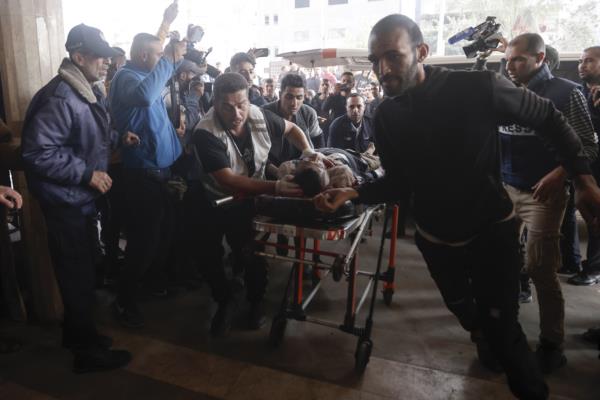
Whispers of uncertainty billow like somber clouds over the Gaza Strip these days, a cacophony of chaos and fear resonating from every corner. The Israeli government, a seemingly steadfast structure, finds itself in the crosshairs of pleas from its closest European allies amidst growing tensions in the 10-week war. Protests on home soil are swelling into a tide of public outcry following a string of shootings, including ones involving hostages who innocently brandished a white flag.
Wrapped in a cloak of turmoil, the nation is being coaxed to rekindle its negotiations with Gaza's enigmatic rulers, Hamas, a collective they've vowed to dismantle. The upcoming visit of U.S. Defense Secretary Lloyd Austin is likely to bring yet another layer of pressure, aimed to scale back the larger combat operations. Amid blood and rubble, humanity's undeniable voice echoes - stop the war, save the civilians.
The brutally unrelenting war has transformed the lush landscapes of Northern Gaza into a wretched wasteland, where civilians lie as casualties, and the population swells in the concentrated encampments of the southern region. The ghostly whispers of a staggering 1.9 million Palestinians, who have been forced to leave their homes behind, infuse the air, and survival comes not from abundance but from sporadic trickles of humanitarian aid.










Hope clings to the prospect of U.N aid trucks lining the Israeli border, ready to extend a helping hand while their ravenous engines roar in the stillness of the Kerem Shalom crossing. Yet, the anticipation of aid sometimes curdles into desperation. There are tales of Palestinians, clamoring around the aid trucks as they rumble in through the Rafah crossing, their hollow faces mirrored in the relentless desire for survival.
As the relentless waves of conflict surge, Israel's Prime Minister, Benjamin Netanyahu, remains an unyielding figure against the storm. His eyes are locked onto a target - the eradication of Hamas. Fueled by the promise of bringing back a captured horde of hostages, Netanyahu is likely to face a storm of anger, one that could tip the scales towards renewed and potentially life-changing negotiations.
However, the besieged city of Gaza isn't quite sunk in silence and oblivion. Telecom services flicker back to life, offering a glimmer of connection amidst severance. The availability of communications is like a pulsating heartbeat keeping afloat the rescue efforts. But as negotiations brew and violence simmers, the anticipation of peace beckons.
High dignitaries from France, U.K, and Germany join the choir of voices calling for an immediate cease-fire, their echoing sentiments a unified expression of mourning civilian casualties. They remind us that victory in warfare isn't about annihilating the enemy but about nurturing a sustainable environment of coexistence.
Endless echoes persist — of lives still anchored in the midst of wreckage — hostages, women, children — all victims of an unending hailstorm of violence. They tell tales of how their resilience is a testament to their undying hopes for a brighter tomorrow — a day without the echoes of gunfire and explosions. Their perseverance serves not just as a reminder of the human spirit but also as a call for an immediate end in the war they did not ask for.
The casualties from this conflict are staggering - more than 18,700 Palestinians are in the grave, and thousands more remain trapped under the rubble of what was once their homes. Yet the plight of these countless victims barely scratches the surface of Israel's collective consciousness, where the horrors from the Oct.7 attack still cast a long and eerie shadow over the populace.
In the cobweb of conflict, where perpetrators and victims are tangled, it becomes increasingly paradoxical to pinpoint the victors of the war. The concept of victory turns nebulous when immersed in the stomach-churning mix of death, destruction, and despair.
While the chilling winds of war continue to howl, the cry for peace grows louder. The people want an end to the warfare, they want to see hostages released, aid given, and most of all they want a sustainable resolution that promises a harmonious coexistence. As the battle rages on, hope still sparks in resilient hearts and protesting voices, however small, but significant, carrying the plea for a resounding cease-fire.







